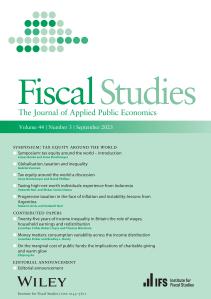Yesterday the Labour Party proposed abolishing ‘non-dom’ status except for people who only come to the UK for a short period.
Foreign domiciliaries, or ‘non-doms’, are people who live in the UK but whose permanent home for tax purposes (’domicile’) is considered to be elsewhere.
They are already taxed in full on their UK income and capital gains. But unlike other UK residents, they can opt to be taxed on the ‘remittance basis’, meaning that they are not taxed on their foreign income and capital gains unless they bring the proceeds into the UK. And non-doms get other tax privileges, notably favourable treatment of non-resident trusts, even if they do not claim the remittance basis. For example, a UK domiciliary normally faces an inheritance tax charge when they put assets into a non-resident trust, and pay capital gains tax (CGT) on any rise in value when the assets are sold; non-doms do not have to pay either of those taxes.
Although non-dom status has a history going back more than 200 years, it acquired fresh political prominence in the 2000s. Starting in 2008, the then Labour government required non-doms who had lived in the UK for seven years to pay a £30,000 annual charge, and to give up their income tax and CGT annual allowances, if they wished to be taxed on the remittance basis. Since 2010 the coalition government has tightened the eligibility rules and increased the charge for longer-term residents. The latest increase took effect on Monday and means that the charge is now £60,000 after 12 years in the UK and £90,000 after 17 years. The UK’s regime remains unusually generous, however, though international practice varies.
In 2012–13 114,800 people recorded non-dom status on their self-assessment income tax returns, though the true number of non-doms is likely to be higher than that as non-doms are not obliged to record that status on their tax return unless they claim the remittance basis. Only a minority of non-doms, 46,700 people, claimed remittance basis in 2012–13: the rest either had no significant income or gains kept abroad or else chose to pay tax on them. And among those 46,700 people taxed on the remittance basis, only 5,100 paid the charge, the other 89% presumably being people who had lived in the UK for less than seven years. Those 5,100 people between them paid £226 million in remittance basis charges. (Note that that is not the revenue yield from the existence of the charge, since the existence of the charge affects revenue from other taxes too: some people opt to pay tax on their worldwide income and capital gains to avoid the charge, while others decide not to live in the UK at all.) Of this £226 million, £43 million was paid by 3,700 non-doms who had lived in the UK for 7-12 years, and the remaining £183 million by 1,400 non-doms who had lived in the UK for more than 12 years. The government estimates that its latest changes will raise a further £90 million a year from people living in the UK for more than 12 years.
Non-doms are a diverse bunch.
A typical non-dom is a foreigner who comes to work in the UK for a few years and then returns. Such people may be rather footloose and a significant (but unknowable) fraction could be put off coming to the UK by a hefty extra tax bill. Many will also have close family members abroad, and so might be able to avoid UK tax even under Labour’s proposals simply by having assets owned by a family member. As a matter of principle it is also not obvious how the UK should want to tax such people. Is it fair to tax them on, say, capital gains on assets abroad which they sell while in the UK but which may have risen in value before they came here? Or to levy inheritance tax on their worldwide estate if they die a year after arriving in the UK? How long should a person have to live in the UK before we start taxing them like UK domiciliaries? There is not a single ‘right answer’ to such questions, and other countries take a variety of different approaches; for example, Canada rebases all assets to market value when a foreigner arrives there so as to avoid taxing gains that accrued prior to their arrival. Double tax treaties aim (not always successfully) to ensure that the same money is not taxed in more than one country.
But non-doms also include people born and bred in the UK. By default, a person’s domicile is simply the domicile of his or her father (or mother if they were unmarried at the time of birth), though one can change domicile by settling permanently in another country. It is quite possible for a person and both of his or her parents to have been born and lived their entire lives in the UK and yet be domiciled elsewhere, although some practitioners think that HM Revenue and Customs should be much more forceful in challenging such cases as it should surely be possible to show that after 20 years living in the UK someone really does intend to settle here. As a matter of principle it seems hard to justify taxing such people more lightly than other UK citizens. And on a pragmatic level, people who have lived in the UK for many years are presumably less likely to leave the UK in response to a tax rise – though having some ties to (and considerable income or assets in) another country might indicate that they are still more mobile than UK domiciliaries.
The Labour Party argues that abolishing non-dom status except for short-term residents would be fairer than the current system and would raise ‘hundreds of millions of pounds’.
There are three potential sources of additional revenue from Labour’s proposal:
- Abolishing the remittance basis for those currently paying the charge. The 5,000 or so people paying the remittance basis charge are presumably doing so because the charge is less than the tax they would otherwise have to pay on their unremitted income and capital gains. This implies that there is potentially some revenue available from removing this option, but nobody knows how much because those who pay the charge do not currently have to disclose their unremitted income and gains. And the more additional tax is at stake, the more steps people will take to avoid paying it.
- Abolishing the remittance basis for a wider group of those currently claiming it. The fact that most non-doms claiming the remittance basis have lived in the UK for less than seven years (and are therefore not liable for the existing charge) implies that the length of the grace period that Labour proposes to allow for ‘temporary’ residents before full tax becomes payable would be crucial in determining how many non-doms were affected. Labour has said that it will consult on this, though Ed Balls has suggested that the period might be two to three years and that five years would be ‘probably too long’. The shorter this period, the more non-doms will be affected and the more potential revenue at stake, but also the less tied to the UK those affected are likely to be and the more likely they are to be deterred from coming to (or staying in) the UK, with a corresponding loss of revenue.
- Removing some or all of the other tax advantages, such as those associated with trusts, that non-doms currently enjoy even if they do not claim the remittance basis. This may be important as in some cases the tax advantages in question can be large, though again the number of non-resident trusts and the sums involved are unknown. But it is not clear whether Labour would seek to remove these reliefs entirely – or what current EU rules on free movement of capital would allow.
Thus the revenue impact of the policy would depend on details that have not yet been announced (such as the length of the grace period and the treatment of trusts) and on the amounts of foreign money involved, which are not known. It would also depend heavily on how non-doms responded to the reform.
How might non-doms respond to a change?
One extreme response might be to leave the UK altogether (or, perhaps more likely, not to come here in the first place). Another would be to evade the tax by failing to declare all their foreign income etc. to HM Revenue and Customs: such behaviour would be illegal but difficult for HMRC to detect since the money is not brought into the UK, though some progress is being made on co-operating with revenue authorities in other countries to exchange information.
There could also be less extreme responses such as transferring assets to family members abroad, making more use of non-resident trusts, spending enough time overseas to avoid qualifying as UK-resident for tax purposes, or simply generating less overseas income and capital gains. Ingenious tax advisors might find more ways to avoid the tax. Much would depend on the details of the reform.
The likely scale of this type of behaviour is essentially unknowable in advance. When announcing the latest increase in the remittance basis charge in Autumn Statement 2014, the government forecast that behavioural responses would reduce the yield by around a quarter. But that estimate was necessarily somewhat speculative, and even if accurate it does not follow that the behavioural response to a larger tax rise will account for a similar proportion of revenue. Furthermore the Autumn Statement measure applied only to people who had lived in the UK for at least 12 years, who are likely to be much less mobile than those here for shorter periods. And reforming the taxation of non-resident trusts is a potentially significant aspect of the reform without recent UK precedent to suggest what its effect might be.
The overall revenue effect of such a change is equally hard to predict. To the extent that non-doms who currently pay a large amount of tax (the Daily Telegraph reports that non-doms paid £8.2 billion in income tax and National Insurance contributions alone in 2012–13) leave the country altogether, the change could cost the exchequer revenue. If there is less behavioural response and it turns out there is a lot of money currently untaxed overseas then additional revenue of £1 billion or more may be achievable.
The uncertain revenue implications of Labour’s proposed reform does not make it a bad idea: it would be wrong only ever to introduce policies whose effects can be forecast with certainty. And revenue is not the only consideration. There is also the pain caused to non-doms (who would be worse off even if they did not pay any more tax, since the behavioural response is something they would not choose to do in the absence of the reform), and the fairness (or otherwise) of taxing them more like we tax other UK residents. And there could potentially be benefits (or costs) to the rest of society from having non-doms in the UK, over and above their net contribution to the exchequer. Employing people and buying goods and services in the UK do not, in themselves, normally constitute benefits to wider society, since those resources could otherwise be put to alternative uses; but if non-doms are unusually entrepreneurial then there could be some positive spillovers to the productivity of other UK businesses. Some would argue that the presence of a super-rich and socially segregated non-dom elite detracts from the cohesion of British society; others might argue that non-doms bring welcome diversity and vibrancy to British society. The impossibility of quantifying these costs and benefits reliably does not mean they should be ignored.
Conclusions
Even after a series of reforms in recent years, the current non-dom rules look anachronistic. It does seem inequitable to give preferential treatment to some individuals who have lived in this country all their lives. That said, the number paying the remittance basis charge – that is, the number who have lived in the UK for at least seven years and declare substantial overseas income or capital gains – is small. And there are benefits to having highly skilled, internationally mobile individuals living and working here for periods of time. Changes which ironed out the obvious inequities whilst preserving the UK’s attractiveness to mobile workers would be welcome. At a minimum, taxation should be based on objective, observable criteria such as years of residence rather than nebulous and difficult-to-prove criteria such as where one intends to reside permanently and the array of unsatisfactory indicators that are used to proxy that.
The details of Labour’s proposal, especially with respect to the period of time for which people arriving in the UK continue to be taxed preferentially, will be important. Whether it would raise much, if any, revenue is uncertain: we do not know full details of the policy, full details of non-doms’ overseas income and assets, or how non-doms would respond to the reform. But revenue is not the only criterion by which the proposal should be judged. It matters more broadly how far it would improve the efficiency and equity of a clearly problematic aspect of the current tax system.









